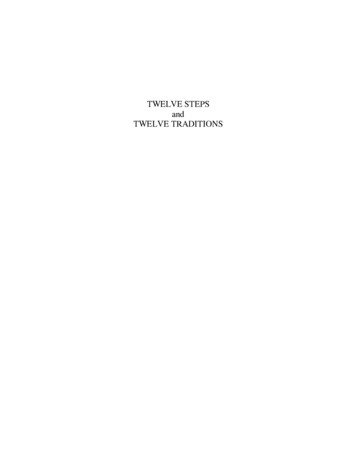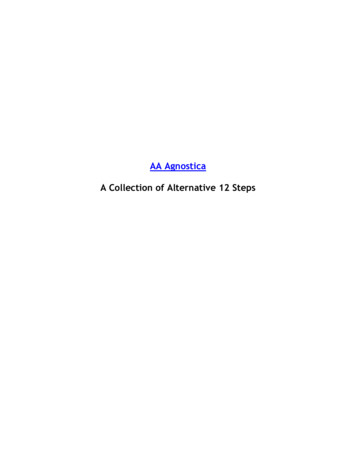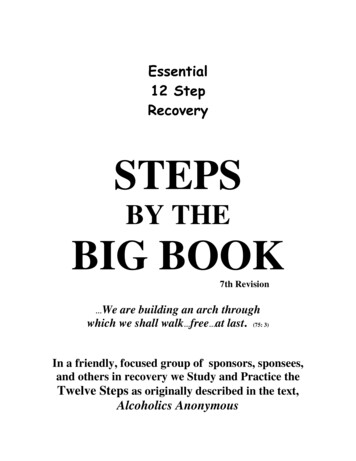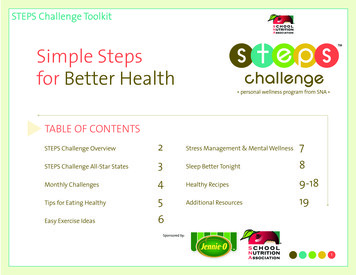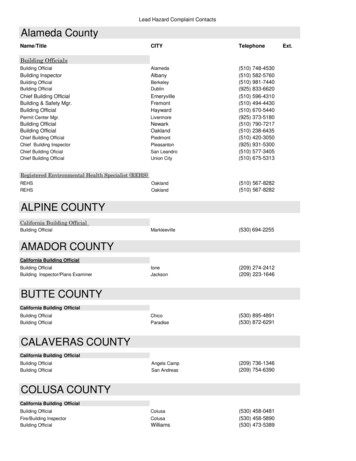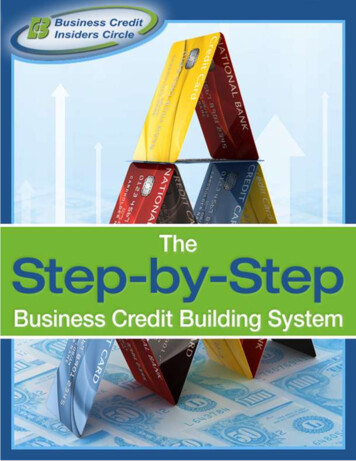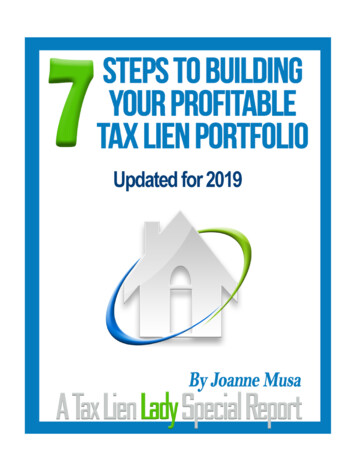
Transcription
7 Steps To Building Your Profitable Tax Lien PortfolioYou Do NOT Have the Right to Edit, Copy, Reprint,Resell this Report!You DO Have the Right to Give Away this Report ToOthers Who May Benefit From ItShare it With Others By: Giving it away to your blog readersGiving it away as a freebie to those who sign up for your mailing listGiving it away as a free bonus to your paid productsGiving it away to members of your membership site as a free bonusGiving it away to your customers or clients as a giftGiving it away during a webinar as a learning toolALL RIGHTS RESERVED. No part of this report may be reproduced ortransmitted in any form whatsoever, electronic, or mechanical, includingphotocopying, recording, or by any informational storage or retrieval systemwithout express written, dated and signed permission from the author.DISCLAIMER AND/OR LEGAL NOTICES: The information presented inthis report represents the views of the publisher as of the date of publication.The publisher reserves the rights to alter and update their opinions based onnew conditions. This report is for informational purposes only. The author andthe publisher do not accept any responsibilities for any liabilities resultingfrom the use of this information. While every attempt has been made to verifythe information provided here, the author and the publisher cannot assume anyresponsibility for errors, inaccuracies or omissions. Any similarities withpeople or facts are unintentional.Copyright 2007-2020 Tax Lien Consulting LLC & Joanne Musa
7 Steps To Building Your Profitable Tax Lien PortfolioIntroductionLet’s go over some basics about tax lien investing and then we’llget down to the 7 steps to building your portfolio of profitable taxliens or tax deeds. What is a tax lien anyway and what’s thedifference between a tax lien, a tax deed, and a redeemable deed?When you purchase a tax lien, you are paying the taxes onsomeone else’s property in order to receive the interest or penaltyamount on your money that the local taxing district would chargethe taxpayer. Basically, you’re providing the delinquent taxpayer ahigh-interest loan, which is secured by real property. You do nothave any ownership rights to the property. But, if the owner failsto pay the lien in a certain amount of time, then the lien holder canforeclose on the property. This time frame is known as theredemption period. And each state can have a different redemptionperiod.When you purchase a tax deed, you are purchasing the deed to atax delinquent property. The property changes hands from thedelinquent property owner to you, if you are the highest bidder atthe tax sale. A redeemable deed is something that is kind of inbetween a tax lien and tax deed. You bid for the deed at the taxsale, but there is still a redemption period in which the delinquentproperty owner can redeem his or her property and buy it backfrom you. To do so they must pay a penalty which differsaccording to the state. There are only 7 states and one city that sellredeemable tax deeds.My students and I have used the following seven steps to buyprofitable tax lien certificates and tax deeds. These steps will workregardless of which state you are investing in and whether you areinvesting in liens or deeds. The details of how you accomplisheach step may change depending on which state you are investingin and whether you are investing in tax lien certificates, tax deeds,or redeemable tax deeds, but the seven steps remain the same.Copyright 2007-2020 Tax Lien Consulting LLC & Joanne Musa
7 Steps To Building Your Profitable Tax Lien PortfolioStep 1: Pick The Right Place To InvestWhere do you live? How much money do you have to invest?Are you investing for the future or for current income? Doyou want to own and manage property, or are you just lookingfor investment income?Your answers to the above questions will determine where thebest places are for you to invest and how you will profit fromyour investment later. Everything that you do to develop aprofitable portfolio will be based on your answers to thesequestions. If you’re investing for retirement or future income,you should consider investing through a self-directed IRA. Youcan invest in tax liens and tax deeds with money from your selfdirected IRA, solo 401K or other qualified retirement plan thatyou control. If you’re investing for more immediate goals,however you’ll want to use after-tax money to invest with.If you want to invest in tax liens because of the chance of gettingthe property, I suggest that you buy tax deeds or redeemable taxdeeds instead. Tax lien certificates on good properties will almostalways redeem. If you do your research and bid on goodproperties, your chances of foreclosing on one of your liens arevery slim. And in some states, even if you did get the opportunityto foreclose on a tax lien, it could take years (during which youwould have to continue to pay the taxes on that property).You’ll need to identify the area or areas that you will be investingin. If you want to invest in multiple areas or more than one state, Isuggest that you learn how to be successful in one area or statebefore moving on to another. Every state has different laws andprocedures regarding tax sales. What worked in one state may notwork very well in other areas or other states.Copyright 2007-2020 Tax Lien Consulting LLC & Joanne Musa
7 Steps To Building Your Profitable Tax Lien PortfolioStep 2: Get The Tax Sale InformationThe first thing that you want to do in order to buy tax liens or taxdeeds, once you’ve decided where you’re going to invest, is to findout when and where the tax sales are. So how do you find outabout tax sales?If you are only interested in a few specific counties, you can call thetax collector and find out where and when the tax sale is held and ifthere is any information available online. If you are investing indifferent parts of the country, however, or if you really are not surewhere you want to start investing and want to see what tax sales arecoming up in different states, you can use an online service likewww.TaxSaleResources.com.Tax Sale Resources is a national database for tax sale information. Asubscription to Tax Sale Resources is included with membership tothe Tax Lien Profits Accelerator . With Tax Sale Resources, youcan do a custom search to find out what tax sales are coming uparound the country. You can also order premium tax sale lists, whichmake researching tax sale properties much easier or you candownload as received list from the county for free. You can searchfor tax sales in just one state or nationwide. You can search foronline tax deed sales, or all the redeemable sales coming up, or onlyonline tax lien sales. You can also search by bidding procedure.I do a search each month to let subscribers of the Tax Lien ProfitsAccelerator (Tax Lien Lady’s member’s area) know what tax salesare coming up during our monthly member coaching call. And sincemembers have access to Tax Sale Resources, they can also search forupcoming tax sales any time they want.There is another way of finding out about upcoming tax sales, butit’s doesn’t always work. It all depends on whether the county ortaxing district has information online. You can google the countyCopyright 2007-2020 Tax Lien Consulting LLC & Joanne Musa
7 Steps To Building Your Profitable Tax Lien Portfolioname and the words “tax sale” and see what comes up. The onlyproblem with this is that sometimes you get links to marketers thatare selling information on how to invest in tax liens for that countyand not the actual county sale information.A better way to search online for this information is to search for thecounty tax collector’s web site and then search for the tax saleinformation. To do this you can start with www.NACO.org whichlists all counties for each state. Then you can go to that county’s website and find a link to the tax collector’s web site if they have one. Atthe very least you can find contact information for the municipal orcounty tax collector or treasurer’s office and contact them directly toask for information about the tax sale.Step 3: Do Your Due DiligenceResearching the tax sale properties to find the right ones to bidon, based on your goals, is the most important step in theprocess. Doing this properly or not could mean the differencebetween being extremely profitable and losing money on yourinvestment.Once you have a list of properties that are in the sale, you need todo your due diligence on these properties before you bid. Theexact procedures that you follow will vary depending on whichstate you are investing in and whether you are investing in tax liencertificates or tax deeds. You need to do a little more due diligencefor tax deeds than you do for tax liens.When buying a tax lien, you are not purchasing the property,you’re paying the taxes and putting a lien on the property. But youstill need to make sure that the property is valuable. You want tomake sure that it’s worth a few times more than the taxes that youare paying, otherwise, the lien will not be redeemed, and you mayhave more money into it than it is worth.Copyright 2007-2020 Tax Lien Consulting LLC & Joanne Musa
7 Steps To Building Your Profitable Tax Lien PortfolioIt’s even more important to do your due diligence on tax deedssince you are purchasing the property. You’ll want to do more thanjust check the value of the property and make sure that it is worthwhat you’re paying for it. You’ll also want to check that anycurrent lien holders were properly notified of the tax sale. If theywere not notified, they could later have a claim on the property andnullify the sale. You’ll also want to check that there are no liens orjudgments on the property that might survive the tax sale. This willtake some research on your part to find out which liens if anysurvive a tax sale in your state, because every state has differentlaws regarding what survives the tax sale.And for both tax lien and tax deed properties, you’ll want to makesure that there are no environmental problems. This informationcan be found online for most states but sometimes you will have togo to the county assessment office or county hall of records to getthe information that you need.Step 4: Prepare To Bid At The AuctionPreparing to go to the sale includes registering to bid at the saleand making sure that you have all your paperwork and paymentin order. In most states, you need to register before the sale inorder to bid.Depending on which state and county you are investing in, youmay need to register days or even weeks before the sale. Somecounties and municipalities do not require you to register ahead oftime, only that you submit the proper paperwork if you are thesuccessful bidder on a property. Some counties will require adeposit in order to register. The deposit amount could be anywherefrom 100.00 to a few thousand dollars (as in the case of manyonline tax sales). Large deposits are usually returned to the investorif nothing is purchased at the auction. Smaller deposits aresometimes returned and sometimes not returned, depending on thecounty. Sometimes there is a cost for participating in the tax sale,Copyright 2007-2020 Tax Lien Consulting LLC & Joanne Musa
7 Steps To Building Your Profitable Tax Lien Portfolioregardless of whether you win any bids or not. It’s best to check outthe terms and conditions of bidding in the tax sale before youregister to bid.You also need to make sure that you have the proper funds forpayment before you go to the sale. For most tax sales, onlycertified funds are accepted. Many counties expect payment theday of the tax sale. If you don’t have proper payment whenexpected, not only will you lose a successful bid, but you’ll also bebanned from future tax sales. It’s important to find out what theacceptable forms of payment are and arrange to have the rightpayment on the day of the sale.Step 5: Bid At The Tax Sale!It’s important to know what the bidding procedure is and whatyour bidding strategy is before you bid at a tax sale. You'll haveto decide beforehand just how much you are willing to pay foreach property that you want to bid on, or how low (in interest)you will bid.I suggest that you attend at least one tax sale before you bid so thatyou are aware of the bidding procedure and what the competitionis like. There are 4 different common bidding procedures andsome states may use a combination of these. Here are the fourmost common bidding procedures: Bidding down the interest rateBidding up the cost (known as Premium or Overbid)Biding Down the Percent Ownership InterestRandom Selection and/or Round RobinTax lien sales can be very different from state to state or even fromcounty to county within a state. Tax deed sales are pretty much thesame around the country. At a live tax deed auction, the propertiesare read off by the auctioneer in the order that they are listed, and theCopyright 2007-2020 Tax Lien Consulting LLC & Joanne Musa
7 Steps To Building Your Profitable Tax Lien Portfolioprice of the property is bid up.In states that have online tax deed auctions, like some counties inCalifornia and Florida, you must register online and put up a depositbefore your bids will be submitted. The properties are usually listedin batches and a time frame is given for each batch. You put bids inon the properties that you want to bid on, but you don’t know whoelse is bidding and what the other bids are. You may not even knowif you are the successful bidder on a property until after the sale.Tax lien sales can differ greatly from state to state. In some states,the interest rate is bid down. This happens in Florida and Arizona,(two of the most popular tax lien states) Illinois, and in NassauCounty, NY.In other states, the interest rate is kept constant and the price of thelien is bid up. The amount bid up from the amount due is referred toas “over-bid” or “premium” and each state handles it a littledifferently. In some states, you receive interest on the premium paidfor tax liens (Alabama and Indiana are two states that give youinterest on your premium). And in other states where premium is bid,you do not get any interest on the premium amount (West Virginia isone of these states). Some states do not pay interest on the premiumamount and do not return the premium to the investor should the lienredeem (Colorado and Vermont).New Jersey is the only state where both the interest rate andpremium are bid. The interest rate can be bid down to 0% and thenthe premium is bid in 100 increments. If the premium is bid, theinvestor doesn’t get any interest on the premium or the certificateamount (remember interest was bid down to 0%). But they will get apenalty on the lien amount, plus they will have the ability to pay allthe subsequent taxes and receive the statutory interest rate on alltheir sub payments. They will receive the premium back if the lien isredeemed within five years.Copyright 2007-2020 Tax Lien Consulting LLC & Joanne Musa
7 Steps To Building Your Profitable Tax Lien PortfolioIn states that bid down the percent ownership interest in the property,the tax lien certificate is awarded to the bidder willing to accept thelowest percent ownership interest in the property. As you canimagine, this makes for some sticky situations should you have toforeclose on a lien, and it is not the ideal situation for the investor.Tax lien sales are conducted in this way in Rhode Island, Nebraska,Louisiana, and Iowa.In states that use the random selection process, the tax collector orauctioneer randomly selects bidders, usually by bidder number foreach parcel as it is read out at the sale. With the round robinprocedure, the tax collector will go around the room, offering thenext parcel on the list to the next bidder in line. The downfall tothese procedures is that you cannot pick which properties you wantto bid on and only do your due diligence on those properties. Hereyou do not know which properties will be offered to you and you canonly accept or decline what is offered to you. The random selectionprocess is used in Wyoming. The round robin procedure is used insome counties in Colorado for liens under a certain amount (theamount differs by county).Step 6: Protect your investmentOnce you purchase a tax lien certificate or tax deed, you needto take steps to protect your investment and maximize yourprofit.Depending on whether you are investing in liens or deeds andwhich state you are investing in, these steps may include: Recording your lien or deed with the county clerk Paying subsequent taxes Clearing the title to the propertyBoth tax lien certificates and tax deeds need to be recorded withthe county clerk in order to be legal and valid. In some states, theCopyright 2007-2020 Tax Lien Consulting LLC & Joanne Musa
7 Steps To Building Your Profitable Tax Lien Portfoliorecording is done for you when you purchase the lien or deed andin other states, you are responsible for recording your lien ordeed. Some tax lien states require the investor to give notice ofthe tax lien to the property owner and any lien holders.When you purchase a tax deed, you have bought the property andare now the owner of record, so you must continue to pay thetaxes unless you want the property to be sold at another tax sale.When you purchase a tax lien you are not obligated to pay thetaxes, but in some states, you can pay the subsequent taxes if theowner doesn’t pay them on time. Some states will give you themaximum interest rate on your subsequent tax payments, making itmore advantageous for you to pay them.Most counties do not issue a warranty deed at a tax sale. Thatmeans that if you purchase a deed at a tax sale, you will mostlikely have to clear the title on the property before a title companywill issue title insurance. Since title insurance is very important tomost buyers, you’ll need to clear the title on a tax deed propertybefore you can sell it.Step 7: Cash in on your investmentThis is the step where you make money. Up to now, you’ve beeninvesting your money, but this is the step where you take yourmoney out and make your profit.To make your money on a tax deed property, you can sell,develop or rent the property. There are also three ways that youcan profit from your tax lien certificate. The property owner couldredeem your lien, in which case you will get your initialinvestment back plus interest and penalties. If the lien does notredeem during the redemption period, you can foreclose on thelien, and in some states take ownership of the property. The thirdway that you can profit from a tax lien is by “assigning” your lienor selling it to another investor.Copyright 2007-2020 Tax Lien Consulting LLC & Joanne Musa
7 Steps To Building Your Profitable Tax Lien PortfolioTracking your lien to keep track of your profit and redemptionvalues are an important part of cashing in on your investment aswell. Tax Lien Certificate Portfolio Tracker Software is aprogram that you can use to track your tax lien certificates or taxdeeds in any state. Find out more about Tax Lien PortfolioTracker at www.TaxLienLady.com/Software.htm.Want My Help?The fastest, easiest way to build your own profitable portfolio of taxliens or tax deeds is to have someone who has done it show youhow. I want to let you know of a very cost-effective way that youcan have me coach you and take you by the hand through each oneof the 7 steps that we have gone over in this report. Get unlimitedcoaching with me for an entire year for under 3K. (and I’ll share allof my ‘secrets’ with you). Find out more atwww.GetProfitableTaxLiens.com.Are you a Self-starter?If you are a self-starter and would like to do this on your own, butneed some guidance and the right tools, you’ll find the help and theresources that you need (plus monthly trainings and groupcoaching) in the Tax Lien Profits Accelerator (Members Area atTaxLienLady.com). You can find out more about the MembersArea at or.Not Sure if Tax Lien Investing is Right for You?I suggest that you attend a tax sale in your area and see what it’slike. If you don’t understand what is going on, then, write downyour questions and send them to me atjoannemusa@taxlienlady.com. I’ll be happy to answer them foryou.I also do a free Facebook Live every Tuesday at 2pm Easterntime. If you’re on Facebook you can join me on my FacebookCopyright 2007-2020 Tax Lien Consulting LLC & Joanne Musa
7 Steps To Building Your Profitable Tax Lien PortfolioBusiness page at https://facebook.com/TaxLienInvestingTips.Bring your questions and I’ll answer them for you live. Or if youaren’t able to be on the live call, you can post your questionahead of time and I’ll answer it for you on the call. The live callsare recorded on the Facebook page and available for you to watchany time you want.Encouraging You To Profit!Joanne MusaCopyright 2007-2020 Tax Lien Consulting LLC & Joanne Musa
7 Steps To Building Your Profitable Tax Lien PortfolioAbout the AuthorJoanne Musa is a tax lien investing trainer and consultant who workswith investors who are ready to build their own profitable portfolioof tax lien certificates or tax deeds. Her very informative andstraightforward articles about tax lien investing appear all over theinternet.Joanne has been featured on internet radio and a national financialonline magazine. She has also been featured on real estate investingweb sites such as, www.REIWired.com, www.Foreclosure.com, andwww.REIBlueprints.com, and in the book “The Venus Approach toReal Estate Investing, and the Amazon best seller, Trust Your Heart:Transform Your Ideas Into Income.” She was mentioned in theJanuary 2013 issue of Forbes, and is the author of the Amazon bestselling book, "Tax Lien Investing Secrets: How You Can Get 8%36% Return on Your Money Without the Typical Risk of Real EstateInvesting or The Uncertainty Of The Stock Market."As CEO of Tax Lien Consulting LLC, and founder ofTaxLienLady.com, she has helped thousands of people from all overthe world to invest in tax lien certificates and tax deeds. Sheinterviews experts from around the country on all aspects of tax lienand tax deed investing and has been invited to speak to real estateinvesting groups throughout the US. Known online as the Tax LienLady, her brutally honest, no-nonsense style sets her apart and hasearned her the title of being the most trusted tax lien investingauthority in America.Copyright 2007-2020 Tax Lien Consulting LLC & Joanne Musa
Let's go over some basics about tax lien investing and then we'll get down to the 7 steps to building your portfolio of profitable tax liens or tax deeds. What is a tax lien anyway and what's the difference between a tax lien, a tax deed, and a redeemable deed? When you purchase a tax lien, you are paying the taxes on
